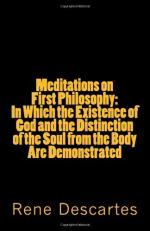The natural attendant of food is sleep; in which the animal forbears not only all his outward motions, but also all the principal inward operations which might too much stir and dissipate the spirits. He only retains respiration, and digestion; so that all motions that might wear out his strength are suspended, and all such as are proper to recruit and renew it go on freely of themselves. This repose, which is a kind of enchantment, returns every night, while darkness interrupts and hinders labour. Now, who is it that contrived such a suspension? Who is it that so well chose the operations that ought to continue; and, with so just discernment, excluded all such as ought to be interrupted? The next day all past fatigue is gone and vanished. The animal works on, as if he had never worked before; and this reviving gives him a vivacity and vigour that invites him to new labour. Thus the nerves are still full of spirits, the flesh smooth, the skin whole, though one would think it should waste and tear; the living body of the animal soon wears out inanimate bodies, even the most solid that are about it; and yet does not wear out itself. The skin of a horse, for instance, wears out several saddles; and the flesh of a child, though very delicate and tender, wears out many clothes, whilst it daily grows stronger. If this renewing of spirits were perfect, it would be real immortality, and the gift of eternal youth. But the same being imperfect, the animal insensibly loses his strength, decays and grows old, because everything that is created ought to bear a mark of nothingness from which it was drawn; and have an end.
Sect. XXVI. Of Generation.
What is more admirable than the multiplication of animals? Look upon the individuals: no animal is immortal. Everything grows old, everything passes away, everything disappears, everything, in short, is annihilated. Look upon the species: everything subsists, everything is permanent and immutable, though in a constant vicissitude. Ever since there have been on earth men that have taken care to preserve the memory of events, no lions, tigers, wild boars, or bears, were ever known to form themselves by chance in caves or forests. Neither do we see any fortuitous productions of dogs or cats. Bulls and sheep are never born of themselves, either in stables, folds, or on pasture grounds. Every one of those animals owes his birth to a certain male and female of his species.
All those different species are preserved much the same in all ages. We do not find that for three thousand years past any one has perished or ceased; neither do we find that any one multiplies to such an excess as to be a nuisance or inconveniency to the rest. If the species of lions, bears, and tigers multiplied to a certain excessive degree, they would not only destroy the species of stags, bucks, sheep, goats, and bulls, but even get the mastery over mankind, and unpeople the earth. Now who maintains so just a measure as never either to extinguish those different species, or never to suffer them to multiply too fast?




